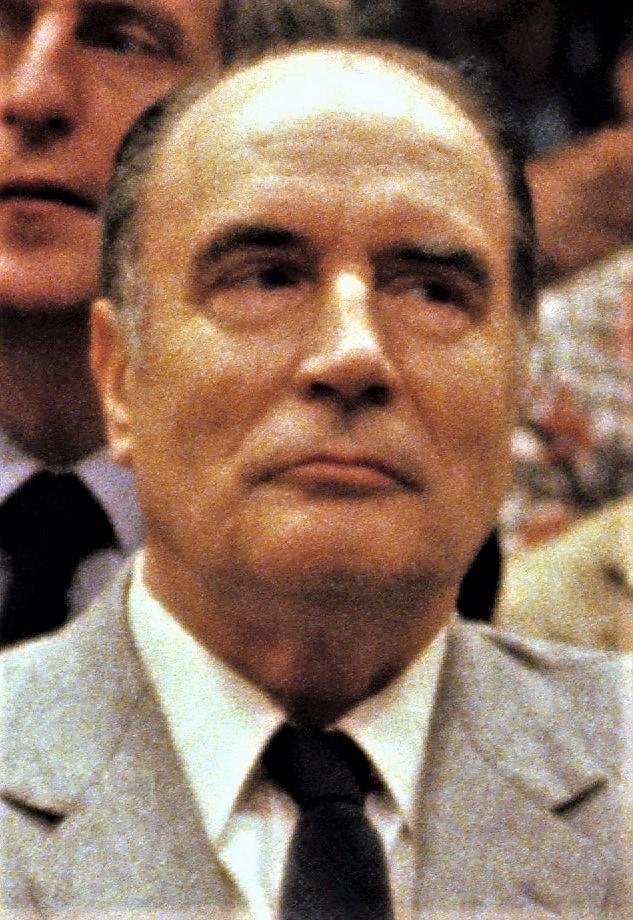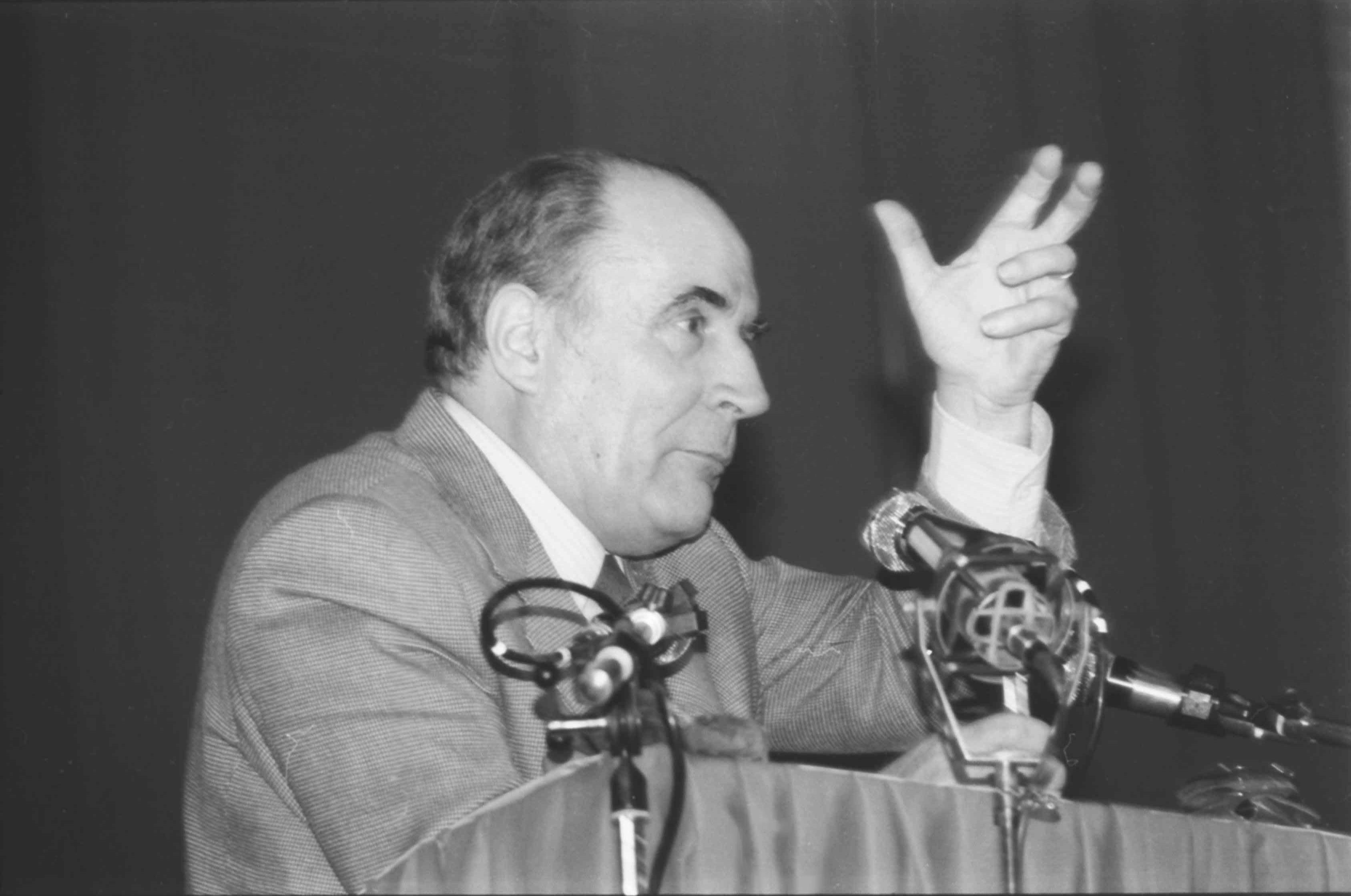In the intricate tapestry of political history, certain figures emerge as enigmatic maestros, capable of orchestrating masterful moves that shape the destiny of nations. François Mitterrand, the enigmatic French president who served for an unprecedented fourteen years, undoubtedly holds a place of prominence in this captivating narrative. Beyond his tenure, Mitterrand’s political legacy reaches far and wide, leaving an imprint that continues to intrigue scholars and analysts. This article embarks on a journey to unravel the captivating enigma of François Mitterrand, exploring the intricate layers of his political brilliance and seeking to understand the lasting impact he had on France and the world at large. With a tone of unwavering neutrality, let us delve into the enigmatic legacy of this political maestro, weaving together the threads of his complex persona to uncover the profound influence he wielded over his tumultuous era.
The Enigmatic Charisma of François Mitterrand: Unraveling the Political Maestro
François Mitterrand, the enigmatic figure who loomed large in French political history, has left behind a legacy that continues to captivate scholars and political enthusiasts alike. Known as a political maestro, Mitterrand’s charismatic persona and strategic maneuvering allowed him to navigate the complexities of power with finesse and intrigue.
One aspect of Mitterrand’s enigma was his ability to maintain a sense of mystery and secrecy throughout his political career. Whether it was his private life or his decision-making process, Mitterrand kept his cards close to his chest, leaving many in awe of his calculated moves. This air of mystery only enhanced his charismatic appeal, drawing people towards his magnetic personality.
- The Art of Compromise: Mitterrand’s political prowess lay in his ability to forge alliances and build consensus, often through skillful diplomacy. He was known for his talent in mediating conflicting interests and finding common ground, enabling him to push through key policy initiatives and cement his place in history.
- Mastering Symbolism: Mitterrand’s affinity for symbolism was a hallmark of his political persona. From the construction of the Grand Louvre to the celebration of the bicentennial of the French Revolution, he used grand gestures to convey his vision and leave a lasting impression on both the French nation and the international stage.
- The Elusive Ideology: Mitterrand’s political philosophy was an enigma in itself, combining elements of socialism and pragmatism. This ability to adapt his ideology to suit the situation allowed him to gain support from a broad range of supporters and maintain his grip on power for 14 years as President of France.
In conclusion, François Mitterrand’s enigmatic legacy as a political maestro continues to intrigue and inspire. His charisma, mastery of diplomacy, and ability to adapt were the cornerstones of his success, leaving a lasting impact on French politics and beyond.

Understanding Mitterrand’s Complex Ideological Journey: A Kaleidoscope of Politics
François Mitterrand, one of the most enigmatic figures in French political history, left an indelible mark on the country’s landscape during his extensive career. With a kaleidoscope of political transformations, his ideological journey was a complex and intriguing one. Exploring the depths of his political evolution reveals a remarkable maestro whose legacy continues to captivate scholars and historians alike.
<p>Mitterrand's political trajectory can be characterized by its intricate layers, as he moved from the far right to the far left before eventually finding his place as a staunch defender of social democracy. This kaleidoscope of politics speaks to his adaptability and ability to reinvent himself in response to changing circumstances. From his early years in the Vichy regime to his later embrace of socialism, Mitterrand's transformation mirrored the ever-shifting dynamics of French politics, showcasing his strategic prowess.</p>
<p>Throughout his presidency, Mitterrand implemented a range of initiatives that shaped the French society. His commitment to social reforms resulted in the introduction of the 39-hour workweek, empowering the labor movement and promoting a more equitable distribution of wealth. Furthermore, he navigated the complexities of European integration, championing the Maastricht Treaty that ultimately led to the creation of the European Union. Mitterrand's ability to navigate political intricacies left a lasting impact on both national and international affairs, solidifying his status as a political maestro.</p>
<p>This kaleidoscope of shifting ideologies and transformative policies makes it clear why Mitterrand's legacy continues to fascinate observers. His lasting impact on French politics and society is a testament to his ability to evolve and adapt throughout his career. Understanding Mitterrand's complex ideological journey is not only a study in political maneuvering but also a glimpse into the deep complexities of human nature itself.</p>
Analyzing Mitterrand’s Policy Reforms: Lessons for Today’s Political Landscape
<p>As we delve into the intricate world of French politics, one name stands out in history - François Mitterrand. Known for his enigmatic personality and remarkable political acumen, Mitterrand left a lasting impact on France's political landscape with his bold policy reforms. Today, his legacy continues to offer invaluable lessons for policymakers and politicians grappling with the complexities of the modern political arena.</p>
<p>Mitterrand's tenure as the President of France from 1981 to 1995 was marked by a series of policy reforms that reshaped social, economic, and cultural aspects of the nation. Through an in-depth analysis of these reforms, we can uncover valuable insights that can guide us in navigating the intricate web of contemporary politics. Here are some key lessons we can draw from Mitterrand's policies:</p>
<ul>
<li><strong>1. Balancing Ideologies:</strong> Mitterrand's ability to navigate between left-wing and centrist policies demonstrated the importance of finding a delicate balance between competing ideologies. This approach allowed him to forge alliances and mitigate potential conflicts, ultimately achieving transformative change.</li>
<li><strong>2. Prioritizing Social Welfare:</strong> Mitterrand's commitment to social welfare reforms highlights the significance of addressing the needs of marginalized communities. By focusing on improving healthcare, education, and social security systems, Mitterrand championed inclusivity and equality, inviting us to consider the welfare of all citizens in our own policy agendas.</li>
<li><strong>3. Promoting European Unity:</strong> Mitterrand played a pivotal role in strengthening European integration, championing initiatives such as the signing of the Maastricht Treaty. His vision of a united Europe serves as a reminder that collaboration and cooperation across borders are essential for addressing contemporary global challenges.</li>
</ul>
<p>Looking back at Mitterrand's leadership and policy achievements, we uncover valuable lessons that transcend time and provide guidance for today's political landscape. By embracing the art of compromise, prioritizing the welfare of the people, and advocating for international cooperation, we can hope to shape a better future in an ever-evolving political realm.</p>
Honoring the Legacy: Exploring Mitterrand’s Enduring Influence
Unveiling Mitterrand’s Enduring Influence
Step into the world of French politics, and one name that casts an indisputable spell is that of François Mitterrand. An enigmatic figure, Mitterrand’s legacy continues to captivate and provoke curiosity even decades after his time as President of France. This towering political maestro left an indelible mark on the nation’s history, shaping it in profound and controversial ways. Let us dive into the depths of his enduring influence, exploring the secrets behind Mitterrand’s political prowess that still resonate today.
<p>Elected as the President of France in 1981, François Mitterrand heralded a new era in French politics. His presidency spanning two terms, from 1981 to 1995, witnessed sweeping transformations in the country's socio-economic landscape. Through a deft mix of pragmatism, charisma, and astute maneuvering, Mitterrand artfully balanced the pursuit of socialist ideals and the need for economic stability. He introduced landmark reforms such as the abolition of the death penalty, the decentralization of power, and the liberalization of television and radio broadcasting.</p>
<p>Under Mitterrand's leadership, France also played a significant role in the European Union, fostering closer integration and cooperation among member states. He championed the creation of the Single European Act, paving the way for the establishment of the European single market, which revolutionized trade within the European bloc. Mitterrand's diplomatic finesse and vision for a united Europe solidified his reputation as a statesman among his international counterparts, his influence reverberating across the continent.</p>
<p class="wp-block-table">
<table class="wp-block-table">
<thead>
<tr>
<th>Key Achievements</th>
<th>Impact</th>
</tr>
</thead>
<tbody>
<tr>
<td>Abolition of the death penalty</td>
<td>Symbolized France's commitment to human rights and the protection of individual liberties.</td>
</tr>
<tr>
<td>Decentralization of power</td>
<td>Empowered local authorities and promoted regional autonomy, strengthening democracy.</td>
</tr>
<tr>
<td>Liberalization of television and radio broadcasting</td>
<td>Enabled greater diversity in media, fostering freedom of expression and cultural exchange.</td>
</tr>
</tbody>
</table>
</p>
<p>However, Mitterrand's legacy is not without its controversies. Criticisms often revolve around his handling of economic policy, as his socialist agenda clashed with the subsequent challenges posed by globalization. The nationalization of key industries and the implementation of high taxation to finance social programs faced significant opposition from the business community and conservative circles, who argued that such measures stifled entrepreneurship and hindered economic growth.</p>
<p>Nonetheless, François Mitterrand's coveted position in French politics remains unshakeable. His enduring influence has left an indelible imprint on France, shaping its trajectory and the values it upholds. The enigma surrounding his legacy continues to intrigue and inspire, reminding us of the enduring power of political leadership.</p> As we dive deeper into the enigmatic legacy of François Mitterrand, one thing becomes abundantly clear – he truly was a political maestro. Through the rollercoaster of his presidency, Mitterrand crafted a legacy that danced on the fine line between admiration and controversy, leaving behind a plethora of unanswered questions for future generations to ponder.
Like a skilled conductor, Mitterrand orchestrated his political symphony with finesse and, at times, cunning. His ability to navigate the convoluted landscape of French politics allowed him to hold his ground over two terms, leaving an indelible mark on the nation’s history. Whether it was his socialist agenda or his unwavering commitment to European integration, Mitterrand’s ambition fueled his every move, propelling him to the forefront of French politics.
Yet, beneath the polished exterior lay a complexity that captivated even his harshest critics. Mitterrand’s knack for blurring the lines between tradition and progress, caution and audacity, perplexed both allies and adversaries alike. His deft strategic maneuvers shook the core of the political establishment and forged a path that defied conventional wisdom.
But within the smokescreen of political intrigue, Mitterrand’s enigmatic nature also obscured a darker side. As we peel back the layers of his legacy, we unveil a man who was not immune to controversy. Questions surrounding his involvement with Vichy France during World War II and his alleged secret love child cast a shadow over his otherwise illustrious career. These unresolved mysteries remind us that even figures of great power and influence can be shrouded in secrets and unceremoniously ushered into the realm of enigma.
The enigmatic legacy of François Mitterrand remains an ever-evolving puzzle, one that defies simplistic categorization. Was he a political virtuoso, a master manipulator, or a deeply flawed human being? Perhaps it is in this very ambiguity that Mitterrand’s enduring allure lies – an allure that continues to captivate and provoke intrigue decades after his departure from the political stage.
As time marches on, the enigma surrounding François Mitterrand’s legacy persists, leaving us with more questions than answers. Yet, it is within the realm of uncertainty that his tale takes on a mythical quality, reminding us that the world of politics is not always as straightforward as it may seem. Mitterrand’s enigmatic legacy endures, compelling us to reflect on the complexities of power, the intricacies of human nature, and the enduring allure of those who defy easy definition.